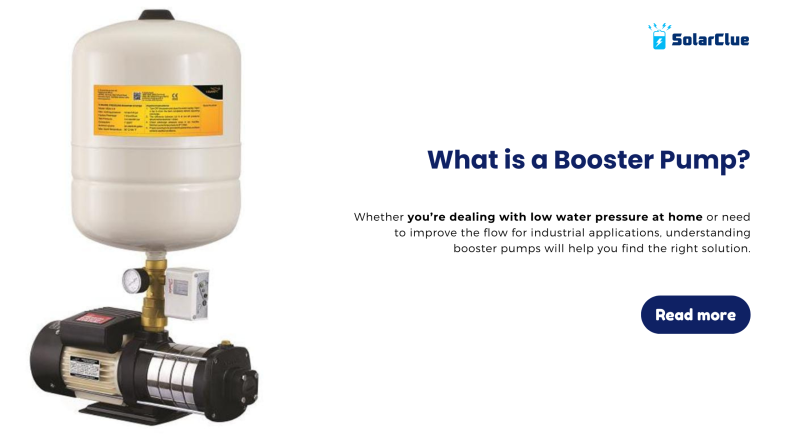What is a Booster Pump?
If you’ve ever experienced weak water pressure while showering or filling a tank, you know how frustrating it can be. Enter the booster pump — a simple yet effective solution for increasing water pressure in homes, industries, and even commercial spaces.
In this blog, we will explore what a booster pump is, how it works, when you need one, and the benefits it offers. Whether you’re dealing with low water pressure at home or need to improve the flow for industrial applications, understanding booster pumps will help you find the right solution.
Table of Contents
What is a Booster Pump?
A booster pump is a mechanical device designed to increase the pressure of water or other fluids flowing through a system. It enhances the water flow rate, making it ideal for situations where the natural water pressure is insufficient to meet your needs.
Booster pumps are widely used in various settings:
- Homes: To boost water pressure for showers, taps, or irrigation systems.
- Industrial applications: To ensure adequate pressure in large-scale operations such as manufacturing plants.
- Commercial spaces: To improve the water flow in buildings, hospitals, or hotels where constant water supply is crucial.
How Does a Booster Pump Work?
A booster pump operates by drawing water from a source (like a well or storage tank) and increasing its pressure before sending it to the desired location. The pump consists of a motor, impellers, and pressure controls. Here’s how the process works:
- Intake of Water: The pump pulls water into the system from the water source.
- Pressure Boost: Using its impeller (a rotating component), the pump increases the pressure of the water.
- Outlet: The high-pressure water is then delivered to the plumbing system, increasing water flow at the outlets.
Booster pumps can either operate automatically with built-in pressure sensors or be manually controlled based on your requirements.
When Do You Need a Booster Pump?
You might need a booster pump if you’re facing any of the following issues:
- Low Water Pressure in Taps or Showers: If the water trickles out of your taps or showerheads, a booster pump can help restore proper pressure.
- Inadequate Pressure in Buildings: Tall buildings often experience pressure loss in higher floors. A booster pump can help maintain even pressure across all floors.
- Irrigation Systems: In agricultural or garden irrigation, low water pressure can reduce the effectiveness of sprinklers. A booster pump ensures water reaches the farthest point of the system.
- Industrial Processes: Many industries require a consistent flow of water at high pressure for their processes, making a booster pump essential.
Benefits of a Booster Pump
Installing a booster pump offers several advantages:
- Improved Water Flow: Booster pumps enhance water pressure, ensuring better flow for everyday tasks such as showering, washing, and cleaning.
- Energy Efficiency: Modern booster pumps are energy-efficient, ensuring that you get the right pressure without significantly increasing your energy consumption.
- Customizable Pressure Control: Many pumps come with pressure settings, allowing you to adjust the water pressure to your specific needs.
- Durable and Long-Lasting: Booster pumps are typically built to last, ensuring reliable performance for years.
Types of Booster Pumps
Booster pumps come in various types, each suited to different applications:
- Single-Stage Pumps: Ideal for residential use where the pressure boost required is minimal.
- Multi-Stage Pumps: Designed for more demanding applications like industrial or commercial settings, providing higher pressure with multiple impellers.
- Variable Speed Pumps: These pumps can adjust the water pressure based on demand, improving efficiency and energy savings.
- Centrifugal Booster Pumps: The most common type, using a rotating impeller to increase the pressure.
How to Choose the Right Booster Pump
When selecting a booster pump, consider the following factors:
- Water Source: Is the pump drawing water from a municipal source or a well? Different sources may require specific pump configurations.
- Pressure Requirements: Understand the pressure needs for your specific application. A home shower will have different needs than an industrial plant.
- Flow Rate: Determine how much water you need to move through the system. A pump with a higher flow rate will move more water but may consume more power.
- Pump Size: Larger buildings or operations might require larger pumps to handle the demand.
Installation and Maintenance Tips
- Professional Installation: For optimal performance, booster pumps should be installed by a professional to ensure the proper sizing and connections.
- Regular Maintenance: Like any mechanical device, booster pumps require regular maintenance, including checking pressure controls, inspecting for leaks, and cleaning the impeller.
- Ensure Proper Sizing: Choosing the correct pump size is crucial. An undersized pump won’t meet your pressure needs, while an oversized pump may waste energy.
Conclusion
A booster pump is a vital solution for anyone facing low water pressure issues, whether at home or in an industrial setting. It enhances water flow, ensuring you can enjoy efficient showers, reliable water supply, and smooth operation in various processes.
With various types and features available, there’s a booster pump out there for every need. Whether you’re upgrading your home water system or improving industrial water pressure, a booster pump can make all the difference.
Contact SolarClue today for expert advice on finding the right booster pump for your needs. Our top brands and personalized guidance ensure you get the best solution to fit your specific water pressure requirements.




